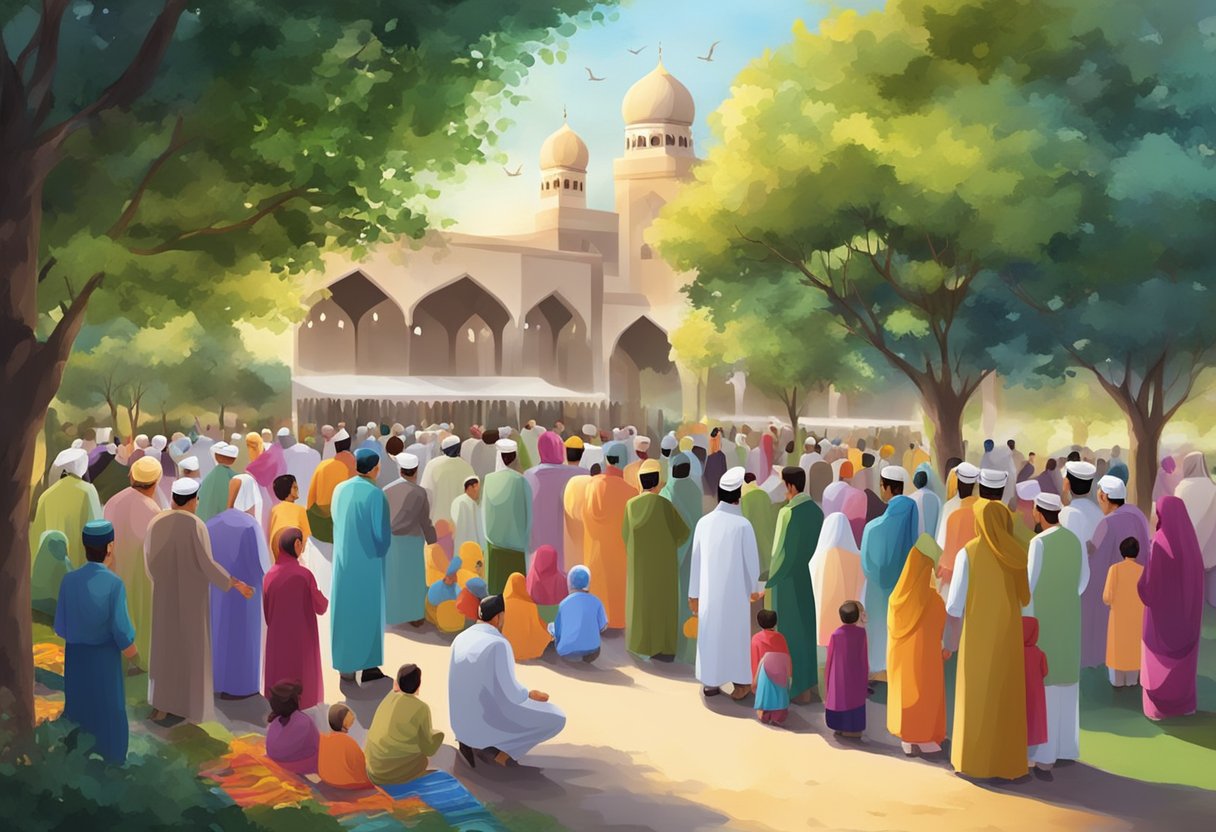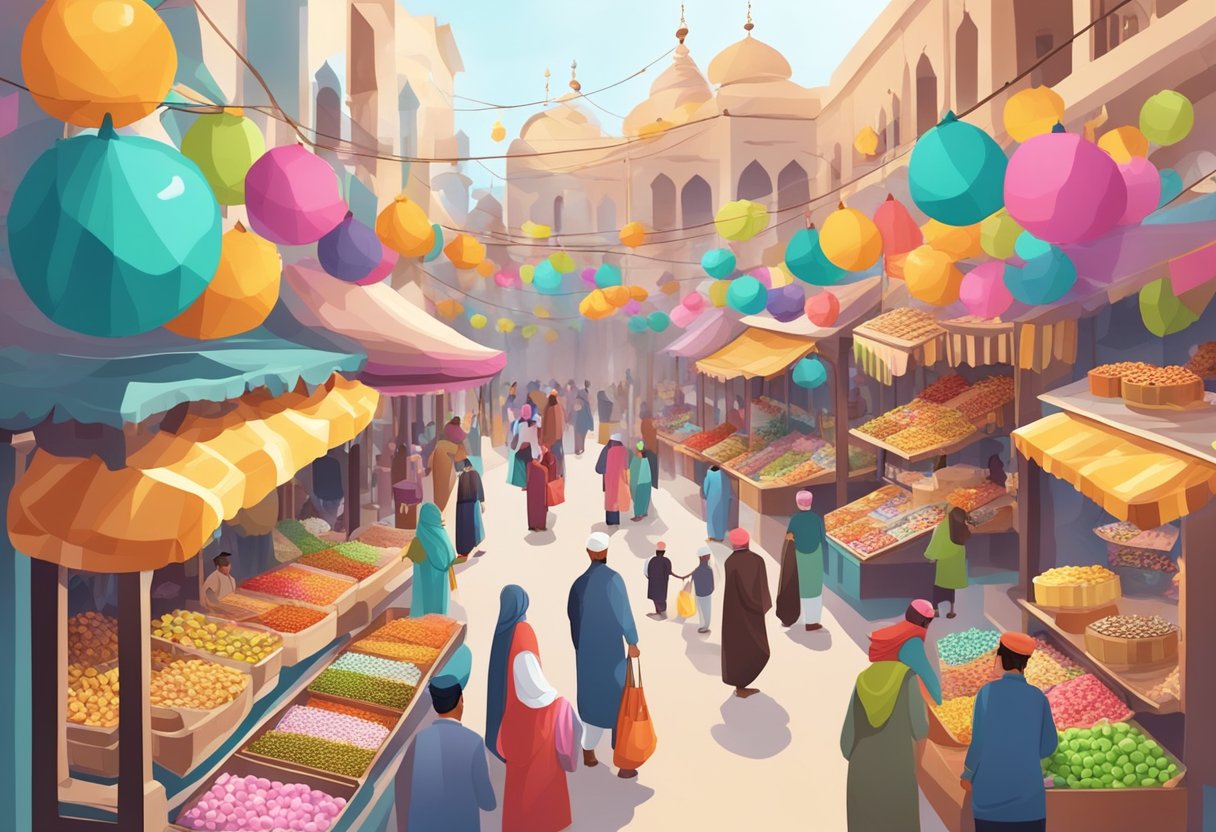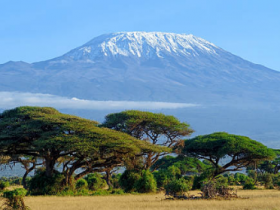Eid ul Fitr 2024 is an important Islamic holiday that marks the end of Ramadan, the month-long period of fasting and prayer. It is celebrated by Muslims worldwide with great enthusiasm and joy. Eid ul Fitr is a time for reflection, gratitude, and family gatherings.

The significance of Eid ul Fitr lies in its religious and cultural aspects. It is a time for Muslims to express their gratitude to Allah for the blessings and strength they received during Ramadan. The holiday also symbolizes the end of a period of spiritual discipline and the beginning of a new chapter in one’s life. Muslims celebrate Eid ul Fitr by performing special prayers, exchanging gifts, and feasting with family and friends.
Key Takeaways
- Eid ul Fitr marks the end of Ramadan, the month-long period of fasting and prayer in Islam.
- The holiday is celebrated by Muslims worldwide with great enthusiasm and joy.
- Eid ul Fitr is a time for reflection, gratitude, family gatherings, special prayers, gift-giving, and feasting with loved ones.
Significance of Eid ul Fitr
Eid ul Fitr is one of the most significant festivals celebrated by Muslims worldwide. It marks the end of the holy month of Ramadan, during which Muslims fast from dawn to dusk. The festival is celebrated on the first day of Shawwal, the tenth month of the Islamic calendar.
Eid ul Fitr is a time for Muslims to come together with family and friends, exchange gifts, and share meals. It is a day of joy and celebration, where Muslims express their gratitude to Allah for the blessings they have received during Ramadan.
One of the most important aspects of Eid ul Fitr is Zakat al Fitr, which is a form of charity that is obligatory for Muslims to give before the Eid prayer. This charity is given to the poor and needy, and it ensures that everyone can participate in the festivities of Eid ul Fitr.
Another important aspect of Eid ul Fitr is the Eid prayer, which is performed in congregation in mosques or open spaces. The prayer is a symbol of unity and brotherhood among Muslims, and it is a reminder of the importance of community and togetherness.
Overall, Eid ul Fitr is a time for Muslims to reflect on their spiritual journey during Ramadan, to celebrate their achievements, and to give thanks to Allah for his blessings. It is a day of joy, charity, and togetherness, and it serves as a reminder of the importance of faith, family, and community in the lives of Muslims.
Date and Calendar
Eid ul Fitr is a significant religious holiday celebrated by Muslims all over the world. It marks the end of the holy month of Ramadan, which is the ninth month of the Islamic calendar. The date of Eid ul Fitr varies every year, as it is based on the sighting of the crescent moon.
In 2024, Ramadan is expected to begin on March 11th, which means that Eid ul Fitr is likely to fall on April 10th or 11th, depending on the sighting of the moon.
It is important to note that the exact date of Eid ul Fitr may vary depending on the region and the sighting of the moon. Muslims around the world may celebrate Eid ul Fitr on different days, depending on their local customs and traditions.
Overall, while the exact date of Eid ul Fitr 2024 may vary depending on the sighting of the moon, it is expected to fall on April 10th or 11th. Muslims around the world will celebrate this important holiday with prayers, feasting, and spending time with family and friends.
Cultural Practices
Prayer and Sermons
Eid ul Fitr is an important religious holiday celebrated by Muslims worldwide. The day begins with a special prayer service, which is typically held in an open area or a mosque. The prayer consists of two rak’ahs (units) and is led by an imam (prayer leader).
After the prayer, the imam delivers a sermon (khutbah) in which he discusses the significance of the holiday and its religious and spiritual meaning. The sermon is an opportunity for Muslims to reflect on the blessings of Allah and the importance of living a righteous life.
Festive Meals
Eid ul Fitr is also a time for celebration and feasting. Muslims often prepare special foods and desserts to share with family and friends. Traditional dishes vary by region, but some popular choices include biryani, kebabs, and samosas.
During the holiday, it is common for Muslims to visit the homes of family and friends to share meals and exchange gifts. This is a time to strengthen bonds of friendship and community.
Charitable Giving
Charitable giving is an important part of Eid ul Fitr. Muslims are encouraged to give to the poor and needy, as well as to their family and friends. This can take the form of donating money or food, or providing gifts to children.
Zakat al-Fitr is a special form of charity that is given during Eid ul Fitr. It is intended to help the poor and needy celebrate the holiday. The amount of Zakat al-Fitr varies by region, but it is typically equivalent to the cost of one meal.
Overall, Eid ul Fitr is a time for Muslims to come together in celebration and reflection. Through prayer, feasting, and charitable giving, Muslims seek to deepen their connection to Allah and strengthen their bonds of community.
Traditions by Country

Middle East
Eid ul Fitr is celebrated with great enthusiasm and zeal in the Middle East. In Saudi Arabia, the day starts with prayers in the mosques, followed by families visiting each other and exchanging gifts. It is a common tradition to prepare a special dish called “Eid Al-Fitr” which is made of vermicelli, sugar, and milk. In Iran, Eid ul Fitr is known as “Eid-e-Fitr” and is celebrated by visiting the graves of loved ones. In Egypt, the day is celebrated by preparing “Kahk”, a sweet biscuit filled with dates, nuts, and honey.
South Asia
In South Asia, Eid ul Fitr is celebrated with great joy and fervor. In Pakistan, the day starts with prayers in the mosques, followed by families visiting each other and exchanging gifts. It is a common tradition to prepare a special dish called “Sheer Khurma” which is made of vermicelli, milk, sugar, and dry fruits. In India, Eid ul Fitr is celebrated by preparing “Sewaiyan”, a sweet dish made of vermicelli, milk, and sugar. In Bangladesh, the day is celebrated by preparing “Pitha”, a sweet cake made of rice flour and coconut.
Southeast Asia
In Southeast Asia, Eid ul Fitr is celebrated by preparing special dishes and visiting family and friends. In Indonesia, the day is celebrated by preparing “Lontong Sayur”, a dish made of rice cakes, vegetables, and coconut milk. In Malaysia, the day is celebrated by preparing “Ketupat”, a dish made of rice cakes wrapped in palm leaves. In Singapore, the day is celebrated by preparing “Satay”, a dish made of grilled meat on skewers.
North America
In North America, Eid ul Fitr is celebrated by visiting family and friends and exchanging gifts. In the United States, the day is celebrated by preparing special dishes and attending community events. In Canada, the day is celebrated by attending prayers in the mosques and visiting family and friends.
Europe
In Europe, Eid ul Fitr is celebrated by visiting family and friends and preparing special dishes. In the United Kingdom, the day is celebrated by attending prayers in the mosques and preparing “Sheer Khurma”, a sweet dish made of vermicelli, milk, sugar, and dry fruits. In France, the day is celebrated by preparing “Couscous”, a dish made of semolina, vegetables, and meat.
Overall, Eid ul Fitr is a time of joy and celebration for Muslims all over the world, and it is celebrated with unique traditions in each country.
Preparation for Eid
Eid ul Fitr is a time of joy and celebration for Muslims around the world. It marks the end of the holy month of Ramadan, during which Muslims fast from dawn to dusk. The festival is celebrated by dressing up in new clothes, exchanging gifts, and preparing special meals. In this section, we will discuss the preparation for Eid in 2024.
Shopping and Decoration
Shopping for Eid begins weeks before the festival. Muslims buy new clothes, shoes, and accessories for themselves and their families. They also decorate their homes with lights, banners, and balloons. Some people prefer to buy traditional items such as prayer mats, Quran, and Islamic calligraphy to decorate their homes.
Food and Sweets Preparation
Food is an essential part of Eid celebrations. Muslims prepare a variety of dishes for their families and friends. They cook traditional meals like biryani, kebabs, and samosas. Sweets such as sheer khurma, seviyan, and ras malai are also prepared. Muslims also donate food to the poor and needy as a part of their religious obligation.
In conclusion, preparation for Eid ul Fitr 2024 involves shopping for new clothes and decorations, as well as preparing special meals and sweets. Muslims around the world look forward to this festival with great anticipation and joy.
Eid ul Fitr 2024 Specifics
Moon Sighting
Eid ul Fitr is a Muslim holiday that marks the end of Ramadan, the month of fasting. The exact date for Eid ul Fitr 2024 is subject to the sighting of the moon of Shawwal, 1445, the 10th month of the Islamic Calendar. According to the IslamicFinder, Eid ul Fitr 2024 is expected to be celebrated on Wednesday 10th of April 2024, or on Thursday, 11th of April, 2024.
Public Events and Celebrations
Eid ul Fitr is a joyous occasion celebrated by Muslims all over the world. Public events and celebrations are held to mark the end of Ramadan and the beginning of Shawwal. Muslims attend special Eid prayers in the morning, followed by a day of feasting and spending time with family and friends.
In some countries, such as the United Arab Emirates, public holidays are declared for several days to celebrate Eid ul Fitr. The private sector is given off on Tuesday, April 9, Wednesday, April 10, Thursday, April 11, and Friday, April 12, 2024, according to Harper’s Bazaar Arabia.
Overall, Eid ul Fitr 2024 will be a time of celebration and joy for Muslims around the world.
Customs and Etiquette
Eid ul Fitr is a time for Muslims to celebrate the end of Ramadan, the holy month of fasting. It is a time for family gatherings, feasting, and gift-giving. Here are some customs and etiquette that are observed during Eid ul Fitr:
- Eid Prayer: On the morning of Eid, Muslims gather in mosques or open spaces to perform Eid prayer. It is recommended to wear new or clean clothes and apply perfume before going to the prayer.
- Greeting: After the prayer, Muslims greet each other with “Eid Mubarak” which means “Blessed Eid”. It is customary to hug and exchange gifts with family and friends.
- Charity: It is a tradition to give charity, known as Zakat al-Fitr, before the Eid prayer. This is to ensure that even the poor can celebrate Eid with a meal and new clothes.
- Feasting: Eid ul Fitr is a time for feasting and enjoying delicious food with family and friends. Traditional dishes vary from country to country, but sweet treats like baklava and sheer khurma are popular.
- Dress Code: It is customary to dress up for Eid ul Fitr. Women often wear colorful dresses or abayas, while men wear traditional clothes like thobes or shalwar kameez.
- Decorations: Some Muslims decorate their homes with lights, banners, and balloons to mark the occasion of Eid ul Fitr.
Overall, Eid ul Fitr is a joyous and festive occasion that brings Muslim communities together. By following these customs and etiquette, Muslims can celebrate Eid with respect and unity.
Impact on Society
Eid ul Fitr is a significant festival in the Islamic calendar, celebrated by Muslims worldwide. The festival marks the end of Ramadan, the month of fasting, and is a time for family gatherings, feasting, and exchanging gifts. The celebration of Eid ul Fitr has a significant impact on society, both socially and economically.
During Eid ul Fitr, Muslims engage in charity work, donate money, and give gifts to the poor and needy. This act of charity strengthens the bond between the rich and poor and promotes social harmony. The festival also promotes peace and forgiveness, and Muslims are encouraged to forgive and forget past grievances and start anew.
Economically, Eid ul Fitr is a significant event that generates revenue for businesses. The festival is a time of increased consumer spending, as Muslims purchase new clothes, food, and gifts for their loved ones. The hospitality industry also benefits from the festival, as families and friends gather to celebrate and feast together.
In conclusion, Eid ul Fitr is a festival that has a significant impact on society, both socially and economically. It promotes peace, forgiveness, and charity, and strengthens the bond between the rich and poor. The festival also generates substantial revenue for businesses, making it an essential event in the Islamic calendar.
Eid ul Fitr in the Media
Eid ul Fitr is one of the most significant religious festivals celebrated by Muslims worldwide. It marks the end of the holy month of Ramadan, during which Muslims fast from dawn to dusk. The festival is celebrated with great enthusiasm and fervor, and it is a time for family gatherings, feasting, and gift-giving.
The media plays a significant role in promoting awareness and understanding of Eid ul Fitr. Many news outlets cover the festival, providing information on its significance, history, and traditions. They also report on how the festival is celebrated in different parts of the world, highlighting the diversity of Muslim communities.
In addition to news coverage, social media platforms play a vital role in spreading the word about Eid ul Fitr. Muslims from around the world share pictures and videos of their celebrations, providing a glimpse into the festivities. Hashtags like #EidMubarak and #Eid2024 trend on social media, bringing together Muslims from different parts of the world.
Overall, the media’s coverage of Eid ul Fitr helps to promote understanding and awareness of the festival. It also helps to foster a sense of community among Muslims worldwide, as they come together to celebrate this joyous occasion.
Frequently Asked Questions
When is Eid ul-Fitr expected to be celebrated in 2024?
Eid ul-Fitr 2024 is expected to be celebrated on Wednesday, April 10, 2024, or on Thursday, April 11, 2024, depending on the sighting of the moon. Estimates that there are 59 days to go until Eid ul-Fitr 2024.
How does the Islamic calendar determine the date of Eid ul-Fitr?
The Islamic calendar is a lunar calendar, which means that it is based on the cycles of the moon. Eid ul-Fitr is celebrated on the first day of Shawwal, the tenth month of the Islamic calendar, which follows the month of Ramadan. The date of Eid ul-Fitr is determined by the sighting of the new moon, which marks the end of Ramadan.
What are the likely dates for Ramadan in 2024?
Ramadan is expected to begin on March 11, 2024, and end on April 9, 2024. Estimates that Eid ul-Fitr 2024 will fall on or near April 9.
What is the significance of Eid ul-Fitr in the Islamic faith?
Eid ul-Fitr is one of the most important festivals in the Islamic faith. It marks the end of the holy month of Ramadan, during which Muslims fast from dawn until dusk. The festival is a time for Muslims to give thanks to Allah for the strength and guidance to complete the month-long fast, and to celebrate with family and friends.
How do different countries determine the public holidays for Eid ul-Fitr?
The public holidays for Eid ul-Fitr vary from country to country. In some countries, such as Saudi Arabia and the United Arab Emirates, the public holiday is three days long, while in others, such as Pakistan and Bangladesh, it is two days long. The exact dates of the public holiday are determined by the sighting of the moon and the lunar calendar.
What are the customs and traditions associated with Eid ul-Fitr celebrations?
Eid ul-Fitr celebrations are marked by a range of customs and traditions. Muslims typically start the day with a special prayer, known as Eid prayer, which is held in mosques or outdoor spaces. They then visit family and friends, exchange gifts, and enjoy festive meals. It is also customary to give to charity during this time, in the form of Zakat al-Fitr, which is a donation to help those in need.
Also Read:
- Tulasi Engineering Limited Tanzania Vacancies 2024: Latest Job Openings
- Management Sciences for Health Tanzania Vacancies 2024: Latest Job Openings
- Bolt Dar es Salaam, Tanzania Vacancies 2024: Opportunities for Job Seekers
- Imperial Dar es Salaam, Tanzania Vacancies 2024: Opportunities for Job Seekers
- Catholic Relief Services: Dar es Salaam, Tanzania Vacancies 2024









Leave a Reply
View Comments